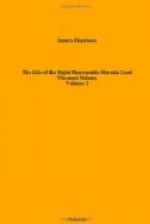the best hearts, to seize the favourable moment, already
beginning to flit away, for effectually restoring loyalty
and order in that devoted country. During the
absence of Lord Nelson and Captain Troubridge, from
Sicily and Naples, Cardinal Ruffo, with his army of
twenty thousand Calabrese and other loyalists, aided
by some hundred Russian troops, had defeated the Neapolitan
republicans, after the evacuation of Naples by the
French under General Macdonald, who succeeded to Championet;
and, in consequence, was actually in possession of
all the capital, except the castles of St. Elmo, Ovo,
and Nuovo, the two latter of which were momentarily
expected to fall. In this state of things, with
many doubts respecting the firmness rather than the
fidelity of the cardinal, and much apprehension with
regard to the pernicious effects of the imposing plausibility
of several chiefs of the numerous parties into which
the distracted country was unhappily divided, every
precaution was considered necessary to be adopted that
human sagacity could contrive, and all the fortitude
judged requisite to be preserved that the most magnanimous
bosom could exercise. Their Sicilian Majesties
well knew, that they had now before them a man, devoted
to their just interests, who possessed, in the supremest
degree, these rare and most estimable qualities.
They intreated him, therefore, to undertake the arduous
task, which could not be securely committed to any
other hands than his own. His lordship was sensible
of the importance of the charge, and overwhelmed with
generous sentiments for the noble confidence expressed
by the royal sufferers in his abilities to render
them those essential services which their peculiar
situation demanded. Difficulty could never deter
the mind of Lord Nelson from any attempt; for, where
there is no difficulty, heroism is without an object.
His lordship had, therefore, not a moment to pause,
with respect to his ready acquiescence in the will
of their majesties; but, from his very imperfect knowledge
of the Italian language, he expressed his apprehensions
that he might be subject to fatal deceptions, if he
should trust to the fidelity of any interpreter among
a people so generally corruptible. He did not,
however, state the objection, without proposing a
remedy. If, his lordship said, Sir William and
Lady Hamilton would accompany him into the Bay of
Naples, that he might have the assistance of their
able heads, and excellent hearts, to consult, correspond,
and interpret, on all occasions, he should not have
the smallest doubt of complete success in the business.
Sir William, and his lady, were accordingly requested,
by the king and queen, to afford their requisite aid
on the occasion: to which they agreed, without
a moment’s hesitation; and, in less than three
hours from the time of his first landing, such was
the dispatch thought necessary, that her ladyship,
having packed up a few articles of the first necessity,
proceeded in the barge, with Sir William and his lordship,
on board the Foudroyant, which instantly sailed for
the Bay of Naples.




